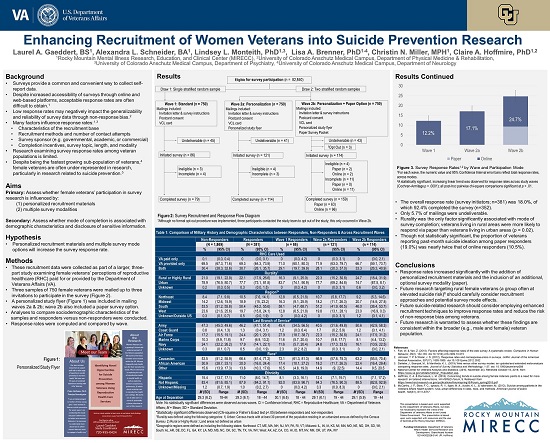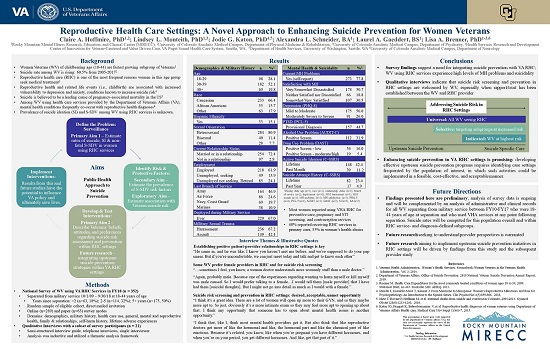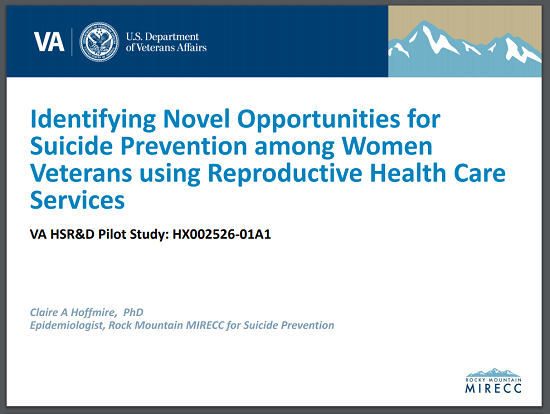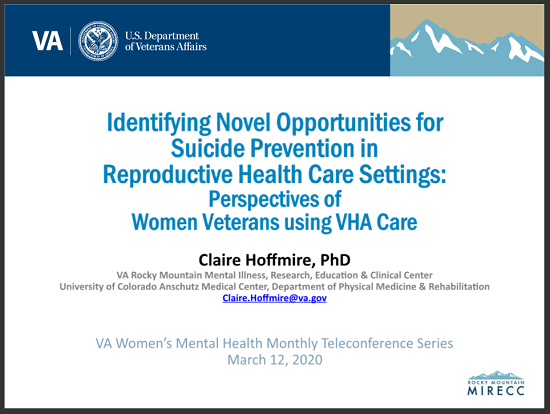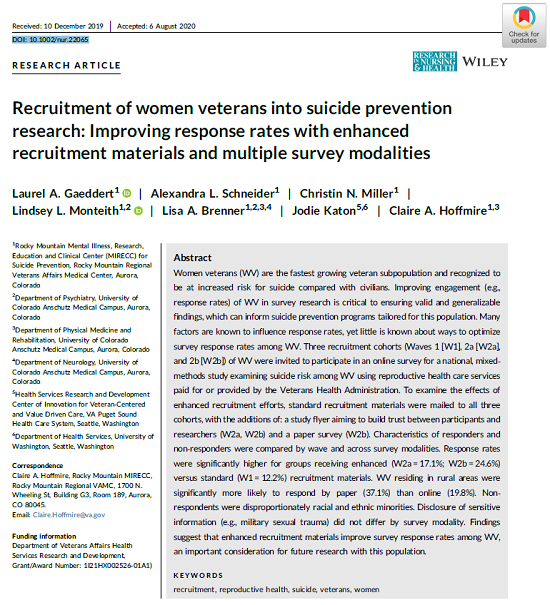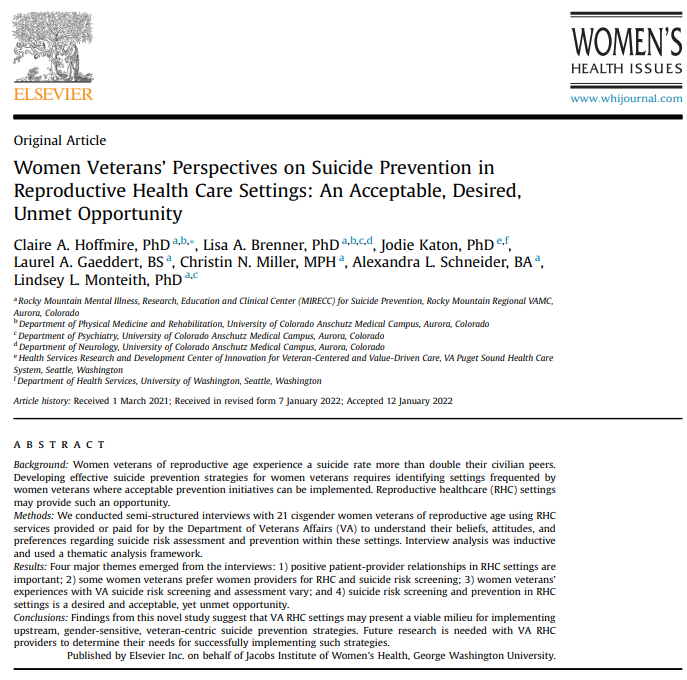MIRECC / CoE
Rocky Mountain MIRECC for Veteran Suicide Prevention

Study Results
A total of 353 women Veterans participated in the survey portion of this study; 269 of whom expressed interested in participating in the follow-up phone interview. Interviews with twenty-one women were conducted over the phone.
This study is currently in the analysis phase; results will be updated regularly as presented and/or published.
April 2019
Preliminary findings from the first 11 qualitative interviews were presented at the 52nd annual American Association of Suicidology (AAS) conference in Denver, CO.
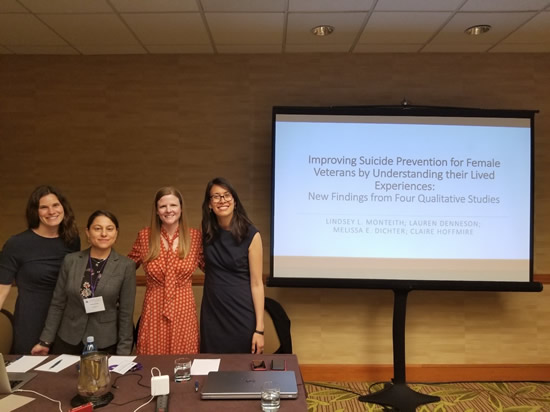
Key Findings: Early interviews suggested that RHC settings are acceptable and promising for upstream suicide prevention strategies targeting women Veterans. The importance of positive provider-patient relationships was emphasized.
August 2019
Lessons learned regarding improving recruitment of women Veterans into research were presented at the joint Department of Veterans Affairs – Department of Defense Suicide Prevention Conference in Nashville, TN.
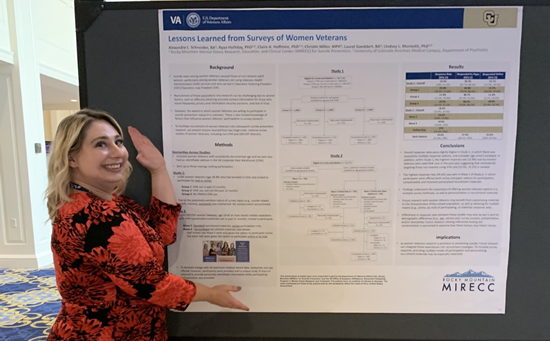
Key Findings: Survey response rates among the women veterans increased when women were provided with enhanced, personalized recruitment materials and offered multiple modes (i.e., online and paper) for survey completion.
October 2019
Additional study findings were presented at the 2019 International Summit on Suicide Research hosted by the American Foundation for Suicide Prevention (AFSP) and the International Academy of Suicide Research (IASR).
Key Findings: Enhancing suicide prevention for women veterans in VA reproductive healthcare (RHC) settings is promising. Integrating suicide prevention in these settings may be especially helpful for women veterans experiencing more mental health symptoms or expressing suicidality. Women veterans indicate that suicide risk screening and prevention in RHC settings is welcome, especially when rapport or trust has been established with their RHC provider.
December 2019
Findings from this study were presented for the December 2019 Health Services Research and Development cyber seminar.
Click here or on the image below to watch the full presentation.
Key Findings: The Female Veteran Suicide Prevention Act of 2016 mandated that the VA work to identify mental healthcare and suicide prevention programs that are most effective for and tailored to women veteran’s needs. Women veterans of reproductive age (18-44 years) are the fastest growing sub-group of Veterans, and reproductive health care (RHC) services are the most commonly sought medical services for these women. Working with women veterans to screen and treat mental health conditions or suicidality within RHC settings shows promise for upstream suicide prevention efforts.
March 2020
Study findings were also presented to the monthly VA Women’s Mental Health teleconferencing series alongside other recent research regarding suicide prevention among women veterans.
Click here or on the image below to watch the full presentation.
Key Findings: Reproductive health conditions are among the most frequently treated conditions for women veterans using VA services, particularly for younger or more recently separated women veterans. Often reproductive health diagnoses occur with medical and mental health conditions that can increase suicide risk (e.g., depression, PTSD, insomnia, body pain, or substance use), so asking about these co-occurrences in trusted RHC settings may provide an opportunity for enhanced suicide prevention for women veterans.
August & October 2020
Findings related to enhancing recruitment of women veterans into suicide prevention research were published online for the journal, Research in Nursing and Health in August 2020 (doi.org/10.1002/nur.22065). This article was also published in the print edition of the journal in October 2020.
Key Findings: Survey response rates among the women veterans increased significantly when women were provided with enhanced, rapport building recruitment materials and offered multiple way to complete the survey (i.e., online and paper). Women living in rural areas were more likely to respond by paper than online. These findings suggest that it is important for researchers to consider enhancing recruitment materials and offering both paper and online survey options in future research with women veterans.
January 2022
Results from the qualitative interviews from this study were published in the Women's Health Issues online in January 2022 (pubmed.ncbi.nlm.nih.gov/35272885/).
Key Findings: Reproductive Health Care (RHC) settings offer an acceptable, desired, and unmet opportunity for suicide prevention among Women Veterans. Qualitative interviews revealed that Women Veterans' experiences with VA suicide risk screening and assessment vary; some Women Veterans prefer women providers for RHC services and suicide risk screening; and that positive patient-provider relationships are important to them in RHC settings. VA RHC settings present viable opportunities to implement upstream, gender-sensitive and veteran-centric suicide prevention strategies.
June 2022
Additional findings from the from the surveys conducted in this study were presented at a local event "Increasing Awareness of Suicide Among Women Veterans: Coming Together to Make a Difference" in June 2022.
Click to View Poster Presentation
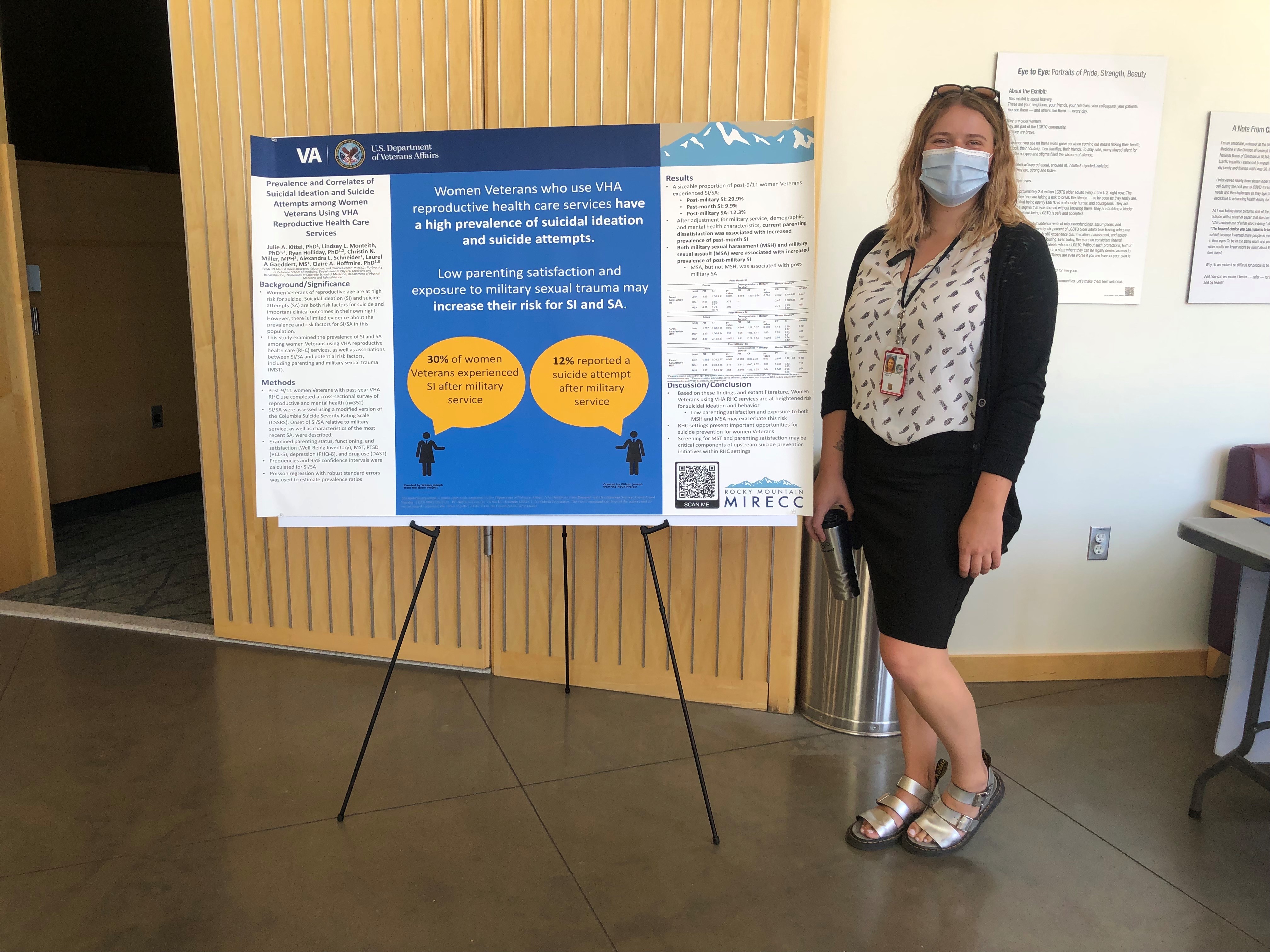
Key Findings: Women Veterans using Reproductive Health Care (RHC) paid for or provided by the VA are at increased risk for suicide. When these women experience low parenting satisfaction or sexual harrassment/assault during their military service (MST), their risk for suicide may be exacerbated. Screening for MST and parenting satisfaction may be critical components for upstream suicide prevention initiatives in RHC settings.
January 2023
Additional findings from the surveys conducted in this study were published in the Journal of Interpersonal Violence in January of 2023.
Click to View Journal Article
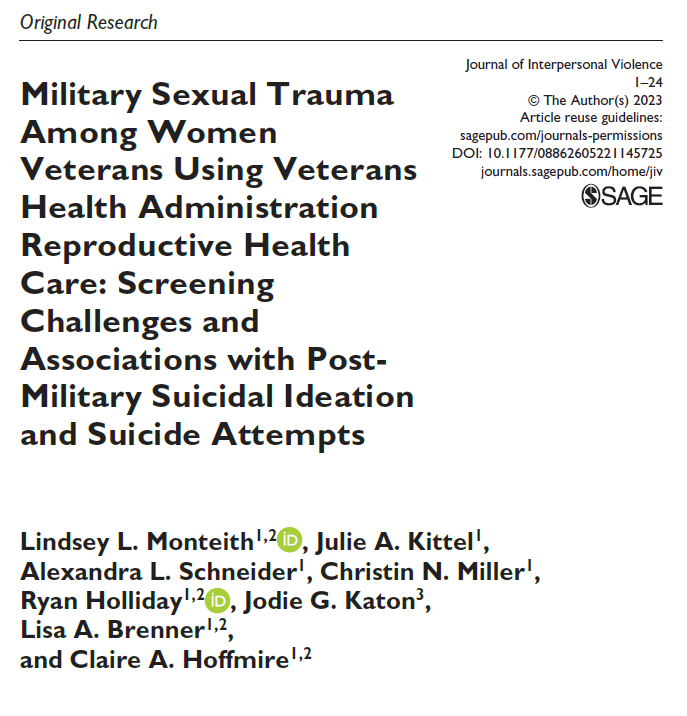
Key Findings: Among 352 post-9/11 Women Veterans using Reproductive Health Care (RHC) paid for or provided by the VA approximately 68.7% screened positive for Miltary Sexual Trauma, including 44.9% who reported experiencing military sexual assault. Our findings suggest that MST may be underreported; 30.8% of these women veterans reported MST on the survey, but had a negative MST screen for their most recent MST screen in their VHA medical record. MST is associated with increased prevalence of experiencing suicidal ideation. Because underreporting MST is highly prevalent among women veterans, rescreening for MST within this population is essential. A trauma-informed approach is recommended irrespective of prior MST screening results and may help facilitate suicide prevention. Addressing barriers to MST disclosure and providing support and resources to prevent MST during military service remain critical.
Please check-back for soon for updated findings.
Last Updated 23 March 2023













